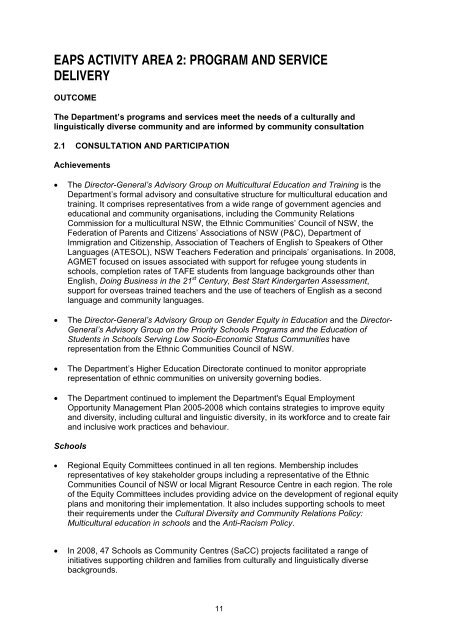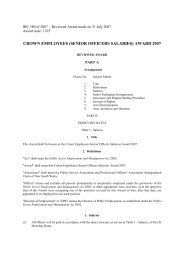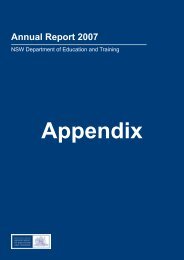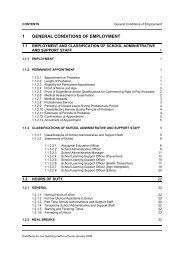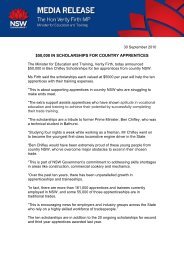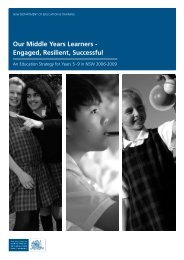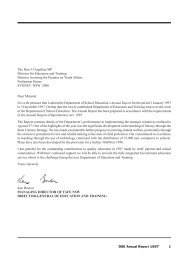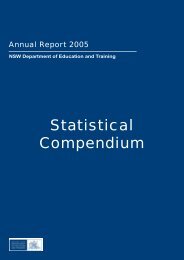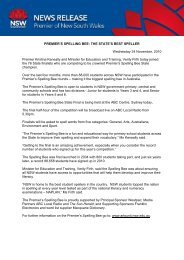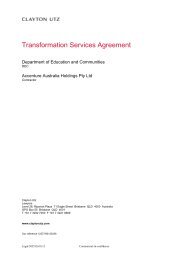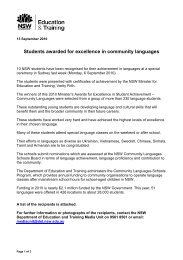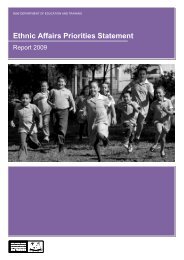NSW Department of Education and Training
NSW Department of Education and Training
NSW Department of Education and Training
Create successful ePaper yourself
Turn your PDF publications into a flip-book with our unique Google optimized e-Paper software.
EAPS ACTIVITY AREA 2: PROGRAM AND SERVICE<br />
DELIVERY<br />
OUTCOME<br />
The <strong>Department</strong>’s programs <strong>and</strong> services meet the needs <strong>of</strong> a culturally <strong>and</strong><br />
linguistically diverse community <strong>and</strong> are informed by community consultation<br />
2.1 CONSULTATION AND PARTICIPATION<br />
Achievements<br />
<br />
<br />
<br />
<br />
The Director-General’s Advisory Group on Multicultural <strong>Education</strong> <strong>and</strong> <strong>Training</strong> is the<br />
<strong>Department</strong>’s formal advisory <strong>and</strong> consultative structure for multicultural education <strong>and</strong><br />
training. It comprises representatives from a wide range <strong>of</strong> government agencies <strong>and</strong><br />
educational <strong>and</strong> community organisations, including the Community Relations<br />
Commission for a multicultural <strong>NSW</strong>, the Ethnic Communities’ Council <strong>of</strong> <strong>NSW</strong>, the<br />
Federation <strong>of</strong> Parents <strong>and</strong> Citizens’ Associations <strong>of</strong> <strong>NSW</strong> (P&C), <strong>Department</strong> <strong>of</strong><br />
Immigration <strong>and</strong> Citizenship, Association <strong>of</strong> Teachers <strong>of</strong> English to Speakers <strong>of</strong> Other<br />
Languages (ATESOL), <strong>NSW</strong> Teachers Federation <strong>and</strong> principals’ organisations. In 2008,<br />
AGMET focused on issues associated with support for refugee young students in<br />
schools, completion rates <strong>of</strong> TAFE students from language backgrounds other than<br />
English, Doing Business in the 21 st Century, Best Start Kindergarten Assessment,<br />
support for overseas trained teachers <strong>and</strong> the use <strong>of</strong> teachers <strong>of</strong> English as a second<br />
language <strong>and</strong> community languages.<br />
The Director-General’s Advisory Group on Gender Equity in <strong>Education</strong> <strong>and</strong> the Director-<br />
General’s Advisory Group on the Priority Schools Programs <strong>and</strong> the <strong>Education</strong> <strong>of</strong><br />
Students in Schools Serving Low Socio-Economic Status Communities have<br />
representation from the Ethnic Communities Council <strong>of</strong> <strong>NSW</strong>.<br />
The <strong>Department</strong>’s Higher <strong>Education</strong> Directorate continued to monitor appropriate<br />
representation <strong>of</strong> ethnic communities on university governing bodies.<br />
The <strong>Department</strong> continued to implement the <strong>Department</strong>'s Equal Employment<br />
Opportunity Management Plan 2005-2008 which contains strategies to improve equity<br />
<strong>and</strong> diversity, including cultural <strong>and</strong> linguistic diversity, in its workforce <strong>and</strong> to create fair<br />
<strong>and</strong> inclusive work practices <strong>and</strong> behaviour.<br />
Schools<br />
<br />
Regional Equity Committees continued in all ten regions. Membership includes<br />
representatives <strong>of</strong> key stakeholder groups including a representative <strong>of</strong> the Ethnic<br />
Communities Council <strong>of</strong> <strong>NSW</strong> or local Migrant Resource Centre in each region. The role<br />
<strong>of</strong> the Equity Committees includes providing advice on the development <strong>of</strong> regional equity<br />
plans <strong>and</strong> monitoring their implementation. It also includes supporting schools to meet<br />
their requirements under the Cultural Diversity <strong>and</strong> Community Relations Policy:<br />
Multicultural education in schools <strong>and</strong> the Anti-Racism Policy.<br />
<br />
In 2008, 47 Schools as Community Centres (SaCC) projects facilitated a range <strong>of</strong><br />
initiatives supporting children <strong>and</strong> families from culturally <strong>and</strong> linguistically diverse<br />
backgrounds.<br />
11


